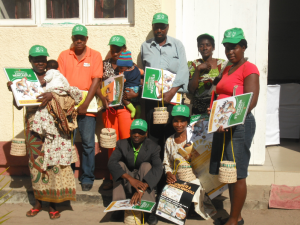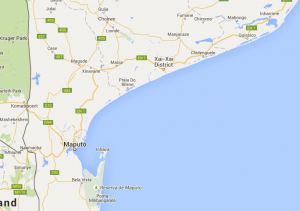KYEEMA commences CCARDESA funded activities in Mozambique
The Centre for Coordination of Agricultural Research and Development in Southern Africa (CCARDESA) funded project is a collaboration between KYEEMA and the Tanzanian Livestock Research Institute (TALIRI) to improve village chicken production for increased income and food security in Tanzania and Mozambique. Activities commenced in Gaza province, Mozambique in June this year. KYEEMA Foundation staff Dr Rosa Costa, Ana Zandamela and Armando Romão, and staff from Veterinary Faculty of the Eduardo Mondlane University commenced several project activities to support the implementation of Newcastle disease control using thermotolerant I-2 vaccine and the dissemination of brooding and creep feed technologies. The project specifically targets youth and female small-scale farmers keeping local chickens.
The project is being implemented in the district of Manjacaze which is located in the south east of Mozambique, north of the large Xai Xai district. Here it is very dry – rain fed agriculture in this province is confined to the few river valleys of Limpopo, Changane and Elephant rivers and the narrow coastal strip. At the inception meeting on June 4, the KYEEMA team from Maputo, the staff from the Provincial Veterinary Services in Xai-Xai and the livestock technicians in Manjacaze district decided upon 4 sites for the project – 2 in Chidenguele area and 2 in Manjacaze headquarters. In each village, awareness meetings were carried out to inform village leaders and farmers about the vaccine and the project activities. From all reports, the community has been well-engaged and activities are largely running to schedule.
Community vaccinators after training, holding extension materials provided and the basket for transport of vaccine to the field.
Map of the southern part of Mozambique where the project is taking place.
In July, 4 technicians (2 female) from the district were trained as enumerators to delivered 200 baseline surveys to the communities. Later that month 2 farmers from each village (5/8 female) were trained as community vaccinators. The training is very interactive: trainees are taught about the importance of the vaccine, how to recognise a sick bird and what other diseases can occur that the vaccine does not protect against. In administering the vaccine they are taught how to hold a chicken for vaccination, how to hold the vaccine dropper properly and the correct way to store and transport the vaccine. They also learn how to talk and work with farmers and convince them that there is economic sense in paying a small amount for the service to have their birds vaccinated. They are provided with a locally designed basket for keeping vaccine cool during vaccination, distinctive vaccinator cap and extension posters.
With the help of the community leaders a vaccination campaign was then launched, which resulted in 200 farmers (50 in each village) partaking in the vaccination of their chickens. Before vaccination, blood samples were taken from 72 chickens to be able to compare the levels of antibodies after vaccination.
Upcoming activities will see the training of farmers in project sites on improved poultry production, further Newcastle disease and other poultry disease surveillance, construction of hay boxes for brooder chickens and identification of appropriate local feed resources. Watch this space.




